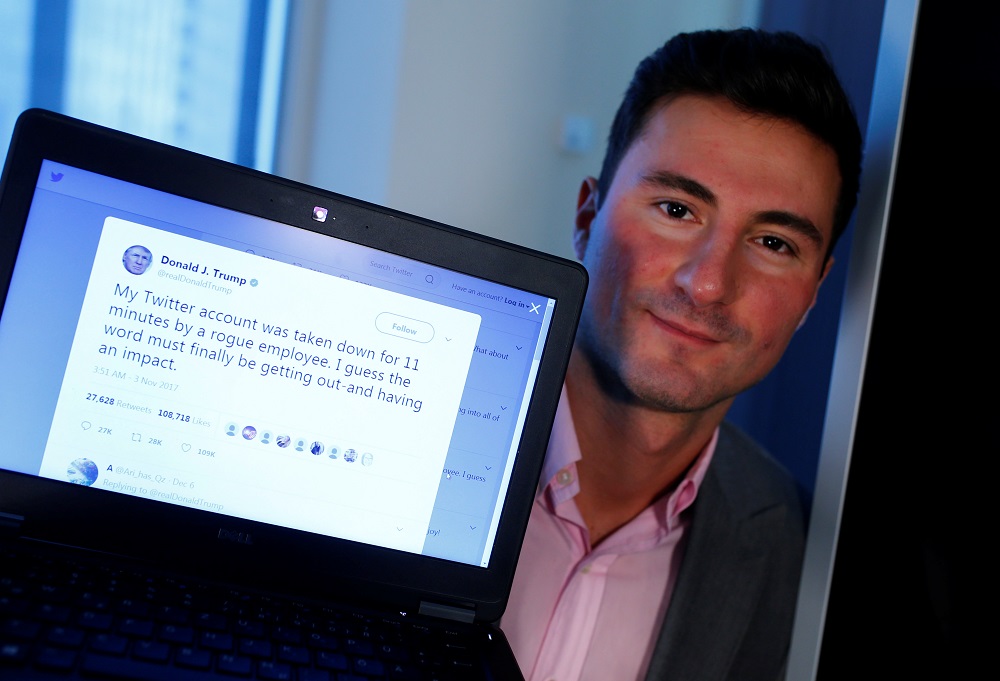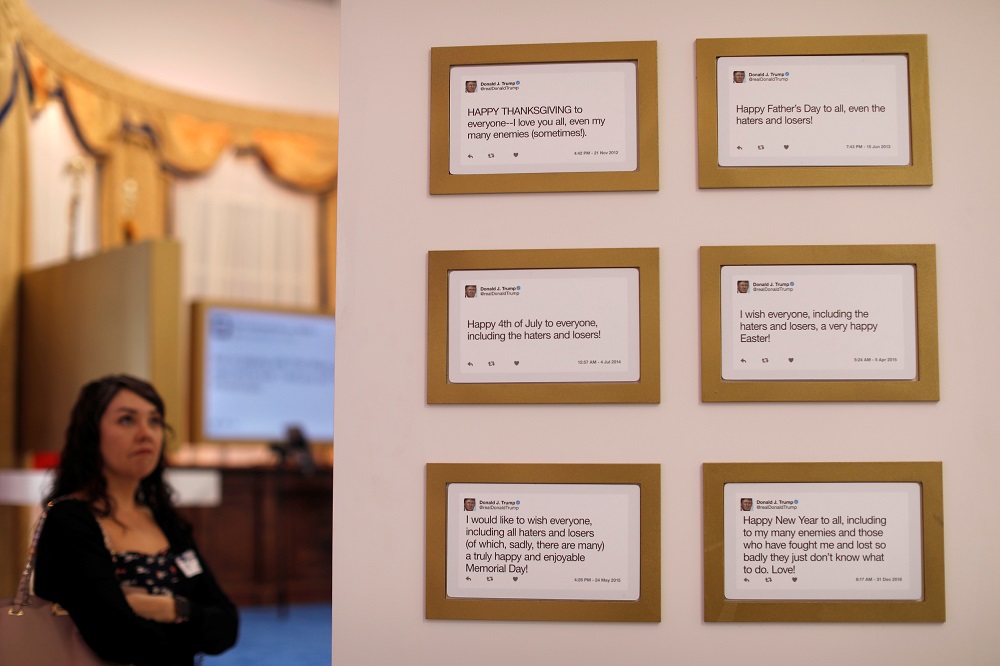في سبتمبر/أيلول 2018، نشر (1) موقع تويتر عبر منصته استطلاعا للرأي بعنوان "نضع السياسات معاً" (Creating new policies together). هذا الاستطلاع هَدَفَ إلى إقرار تحديث على سياسة المحتوى للموقع، إذ أضاف إلى قائمة "التغريدات المحظورة" التغريدات التي "تُجرّد شخصا أو مجموعة محددة من إنسانيتها (Dehumanizing)"، حتى لو لم تكن تلك التغريدة المسيئة موجهة إلى شخص بعينه.
وعن سبب اختيار مصطلح "Dehumanizing" لتوصيف التغريدات المسيئة، أشار الموقع إلى دراسة (2) تربط بين استخدام تشبيهات غير آدمية وممارسة العنف، إذ إن نزع الصفات الآدمية عن الأشخاص يجعل فكرة ممارسة العنف ضدهم مقبولة عند البعض، لذلك اتجه الموقع إلى اقتراح حظرها. وبعد مشاركة أكثر من ثمانية آلاف شخص في استطلاع الرأي، قرر الموقع في يوليو/تموز الماضي إضافة "المجموعات الدينية" إلى الفئات المحمية في سياسة المحتوى، وبالتالي حظر أي محتوى يسيء لأفراد بناء على معتقداتهم الدينية.
بين الإساءة للدين وبروباغندا الحكومة
تويتر -كغيره من مواقع التواصل الاجتماعي- متهم بالتقصير في محاربة التحريض، وملام على ازدياد الخطاب المعادي للاجئين والأقليات، فصعود التيار اليميني في أوروبا والولايات المتحدة في السنوات الأخيرة، انعكس زيادةً ملحوظة في التغريدات التي تحذر من مخاطر اللجوء والهجرة، وتأثير موجات النزوح على ديمغرافية الدول الغربية. هذه التغريدات لم تلق أي رد فعل من تويتر، مع أن المنصة صارمة على الحسابات المعادية للغرب وسياساته، أو تلك التي تمجد حركات "المقاومة"، وحتى الحسابات التي تعتبر منصات لترويج بروباغندا حكومية، كان آخرها حسابات تديرها الصين للتشويش على احتجاجات هونغ كونغ.
إذن، برهن موقع تويتر أنه يملك القدرة والتكنولوجيا لمحاربة أي محتوى مسيء، فلماذا يتساهل مع جزء من التغريدات المتطرفة؟
تبليغات
أكثر من 500 مليون تغريدة تنشرعلى تويتر يوميا بمختلف لغات العالم، بينها آلاف التغريدات المخالفة لسياسات الموقع. وبحسب تقرير الشفافية (3) للموقع، فإن تويتر تلقى أكثر من 3.6 ملايين تبليغ خلال ستة أشهر، منها أكثر من 600 ألف حساب وجد مخالفاً للمعايير. ومع ذلك، فالمنصة لا تراقب المحتوى ولا تزيل التغريدات، حتى وإن كانت مخالفة لسياسة الموقع، إلا بعد ورود تبليغ عن تغريدة معينة أو مستخدم.
تصل هذه التبليغات إلى فريق متخصص في مراجعة المحتوى، فيراجع أحد مشرفي المحتوى التغريدة وسبب التبليغ، وعلى أساسها يقرر إن كانت تستدعي الحذف من الموقع.
لذا بعد إقرار إضافة الإساءة للدين ضمن المحتويات التي تعد مسيئة في سياسة المحتوى على تويتر، أشارت المنصة إلى أن التغريدات المخالفة المنشورة قبل هذا التحديث لن تُزال إلا إذا أُبلغ عنها. وعليه، ومع التحديثات المستمرة، فإنه قد يُزال أي حساب من الموقع إن وردت عليه تبليغات على تغريدات قديمة تسيء لأتباع دين معين، أو للشذوذ والشاذين، أو أي صفة محمية ضمن سياسة المحتوى، حتى لو لم تكن ضمن المخالفات وقت كتابة التغريدة.
لكن، وفي عالم يزداد تطرفاً ومستخدمين يستاؤون بسهولة، يشهد الموقع يوميًّا عشرات آلاف التبليغات ضد محتوى أو ضد مغردين، فمن هم أصحاب الكلمة الفصل في تطبيق سياسة الموقع؟

قام باهتيار دويساك، الذي كان يعمل موظفا في شركة تويتر، بإيقاف الحساب الرسمي للرئيس الأميركي دونالد ترمب لمدة 11 دقيقة عام 2017. باهتيار قال لرويترز إنه على الرغم من أن تلك الحادثة لم تكن مقصودة إلا أنه يعتقد أن كثيرا من تغريدات ترمب تنتهك قانون حظر خطاب الكراهية الذي يطبّقه الموقع على التغريدات. (تصوير: رالف أورلوسكي - رويترز)
شركات مراجعة المحتوى
في عالم مواقع التواصل الاجتماعي، من يضع السياسة ليس هو من يطبقها، فمعظم المواقع تسند مهمة مراجعة المحتوى إلى شركات أخرى، مثل "أسانتور" (Accenture) و"تاسك آس" (TaskUs) و"كونيزانت" (Cognizant). هذه الشركات تعيّن موظفين حول العالم، وتزودهم بقائمة المحتوى المحظور لكل موقع، ويجلسون خلف شاشات الحواسيب لـ8 أو 9 ساعات يوميا، يراجع خلالها كل موظف ما يقارب ألف تغريدة ورسالة وفق تقرير لواشنطن بوست (4)، مما يعني أن الموظف عليه الحكم على المحتوى خلال أقل من دقيقة. وموقع تويتر بسياسة محتواه الفضفاضة، ومئات الملايين من التغريدات التي يتم تداولها، يسند مهمة مراجعة التبليغات إلى 1500 شخص موزعين على 8 دول مختلفة، يعملون لصالح شركة "كونيزانت".
يتنوع المحتوى المسيء الذي يروّج على تويتر بين محتويات تروج لكراهية أو محتوى جنسي أو حتى حسابات تنظيمات مسلحة وانتهاكاتها حول العالم. وفي ظل هذا التنوع، يُفترض أن من يراجع التقارير ويقرر مصير التغريدات، ضليع في الشأن السياسي، أو مختص في القانون أو سياسة المحتوى، أو على الأقل مطّلع على اللغة وثقافة البلد الذي نشرت منه التغريدة. إلا أن تقرير صحيفة الواشنطن بوست كشف أن مراجعي المحتوى لا يتحدثون بالضرورة اللغة المستخدمة في التغريدة، حيث أجرت الصحيفة مقابلة مع مراجعي محتوى تويتر في العاصمة الفلبينية مانيلا، ونقلت عنهم أنهم يراجعون محتوى مكتوبا بعشر لغات لا يتحدثونها، وأنهم يلجؤون إلى مترجم غوغل لاتخاذ قرارهم بإبقاء المحتوى أو حذفه، ولا يملكون خبرة كافية لمعرفة خلفيات التغريدات وسياقاتها.
حذف التغريدات وإيقاف الحسابات دون أخذ السياق بالاعتبار، تسبَّبَ لتويتر في مشاكل عدة، كان آخرها إيقاف حساب الرئيس الفنزويلي نيكولاس مادورو بالإنجليزية لساعات في آب/أغسطس الماضي قبل أن يتم إعادته. وحتى بعيدًا عن السياسة، فبعض حسابات الكوميديين تم إيقافها (5) بسبب تغريدات ساخرة ونكات، لكن الضرر الأكبر الذي قد يترتب على إلغاء المحتوى دون النظر إلى السياق، هو إلغاء منشورات قد تستخدم كأدلة في المحاكم الجنائية، إذ إن المحكمة الجنائية الدولية أقرت استخدام منشورات على مواقع التواصل الاجتماعي كأدلة على انتهاكات يحاسب عليها القانون. وعلى إثرها أصدرت مذكرة توقيف (6) بحق القائد العسكري الليبي محمود الورفلي عام 2017 بالاستناد إلى أدلة نشرت على مواقع التواصل. ولكنّ إقرار تعديلات على سياسات هذه المواقع، والتبليغ عن محتوى يحوي مشاهد توثق ما ارتكب من جرائم وانتهاكات لحقوق الإنسان، دفعا بتلك المواقع ومشرفيها إلى حذف ما قد يكون أدلة (7) تستخدم في المحاكم الدولية لإثبات جرائم حرب.
التبليغ عن محتوى لترمب مثلاً
تنتهي مهمة مراجعي المحتوى عند التغريدات التي تصدر عن شخصيات عامة أو حسابات موثقة، فتلك مهمة يتم رفعها إلى مسؤولي تويتر للبت فيها، فبعد انتهاكات متكررة لسياسة المحتوى من قبل الرئيس الأميركي دونالد ترامب وتحريضه على منافسته هيلاري كلينتون، وعلى صحفيين ووسائل إعلام، ثم على نائبات الكونغرس المسلمات، وُجِهَت للموقع انتقادات حادة بازدواجية المعايير، فحساب الرئيس ومناصريه لم يُمس، بل بات حافزًا لحسابات أخرى ترى في تغريدات الرئيس المحرضة على اللاجئين مثالاً يُحتذى به (8)، بعد أن غرد على تويتر(9) بأنه يعتبر "معارضي الفاشية" (ANTIFA) منظمة إرهابية وانضم إلى المحرضين ضدها، رغم تزايد عدد الهجمات (10) التي يسببها أنصار حركة "تفوق العرق الأبيض" (White Supremacist). لكن، منذ توليه الرئاسة، لم يطالب ترمب يوما بإدراجها في قائمة الإرهاب ولم يكتب يوما نقدا لها.
التساهل مع الشخصيات السياسية التي تغذي صناعة الخوف من الآخر والإكزينوفوبيا، وتصف الأقليات بأنهم محتلون وغزاة، دفعت الموقع لمحاولة الدفاع عن سياسته، فنشر على مدونته توضيحا بشأن "Public interest" أو التغريدات التي تحظى "باهتمام عام" على حد تعبير الموقع، إذ أقر باستثناءات يقوم بها للتغريدات التي يكتبها سياسيون، أو مرشحون للرئاسة أو لأي منصب حكومي، ولديهم على الأقل 100 ألف متابع وحساباتهم موثقة، على أن يظهر تويتر تنويها للمستخدمين بأن هذه التغريدة تخالف سياسة الموقع دون أن يحذفها. وحاول تبرير ذلك بأنه يحافظ على مساحة نقاش عام حر، وأنه يسمح للعامة بأن ترد مباشرة على السياسيين، وأن يحاسبهم المغردون على تغريداتهم لا الموقع.
لكن مساحة الديمقراطية التي يدعيها الموقع تلك، لا تعني فقط أن السياسيين وحدهم مستثنون من سياسة محتوى الكراهية، بل إن من يؤيدهم سيصبح بالضرورة مستثنًى منها، فمثلاً التغريدة التي كتبها (11) ترمب ودعا فيها نائبات الكونغرس للعودة إلى "بلادهن"، والتي اعتبرها كثيرون تغريدة عنصرية تخالف سياسات تويتر ضد الأقليات، ستنعم باستثناء من الحذف أو المساءلة، وأيضا من يعيد تغريدها تأييداً لمحتواها، أو يكتب رداً مُرحّبًا بها، لأنه يوافق سياسيًّا ولا يكتب هو بنفسه تغريدة عنصرية.
ورغم نشر المعايير المتعلقة بالاستثناءات في خطاب الكراهية، وادعائها أنها محاولة لخلق نقاش صحي بين صناع القرار والعامة، فإن هناك حسابات كثيرة لغير السياسيين، مثل ديفد ديوك الزعيم السابق لمجموعة "كي.كي.كي" (KKK) المحظورة من بقية مواقع التواصل الاجتماعي، وغيره من الإعلاميين والمحللين السياسيين الذين يخالفون سياسات تويتر بشكل واضح، لكن يتجنب الموقع إزالة حساباتهم، ليس فقط بسبب العدد الكبير لمتابعيهم، وإنما أيضا ليتجنب القائمون على تويتر الاتهام بمعاداة المحافظين، أو أن يُنسبوا خطأ إلى تيار سياسي محدد، فيصبح الموقع جزءًا من الاستقطابات السياسية بحسب أحد موظفي الموقع.

مجموعة تغريدات عُرضت ضمن مكتبة لتغريدات ترمب أقامها برنامج The Daily Show السياسي الساخر في كاليفورنيا. (تصوير: ماريو أنزوني - رويترز)
هل الشخصيات العامة هي الاستثناء الوحيد؟
تمجيد الإرهاب أو العنف أو الترويج لهما محظور على جميع مواقع التواصل الاجتماعي، إلا أن المناخ السياسي في العالم خلط المفاهيم وعجز عن تقديم تعريف محدد للإرهاب. لكن بعد ظهور ما يدعى تنظيم الدولة الإسلامية واستخدامه الحرفي والمنظم لمواقع التواصل، اجتمعت هذه المواقع وأنشأت "منتدى الإنترنت العالمي لمكافحة الإرهاب" (12) الذي ضم 13 شركة منها: فيسبوك، وألفابيت (الشركة الأم لغوغل ويوتيوب)، ومايكروسوفت، وتويتر، وحتى موقع مشاركة الملفات "دروب بوكس" و"أسك أف.أم".
أتاح هذا المنتدى للمواقع مشاركة المعلومات عن الحسابات والمحتوى الذي يحرض على الإرهاب، و"بروتوكولا" مشتركا حول كيفية التعامل معها. ولأن هذه الشركات بسياساتها تعرّف المحتوى المسيء بطرق مختلفة، فقد اعتمدت "لائحة الأمم المتحدة للمنظمات الإرهابية" (13)، حيث سمح هذا المنتدى للمواقع بتشارك المعلومات وإنشاء قاعدة بيانات مشتركة للمحتوى المحظور (Hashing)، لتسمح بإزالته من جميع المواقع دفعة واحدة، وتحظر مستخدمين وتحذف محتوى بطريقة منظمة بينها، وفق معايير يتم تحديثها بشكل دائم بحسب المعطيات. هذه المعايير تشمل تمجيد أي عمل "إرهابي" ومحاولة لتعريف "الإرهاب" والتفريق بينه وبين الحركات التحررية أو دفاع الدول عن نفسها.
أضاف المنتدى حادثة إطلاق النار على مسجد كرايست تشيرتش في نيوزيلندا (الفيديو والبيان الذي نشره القاتل) إلى قاعدة البيانات للحد من نشرها، لكن لم تضف إلى الآن أي من حوادث إطلاق النار في الولايات المتحدة. بل إن بعض هذه الحوادث الجماعية لم تصنف "إرهابا" من قبل الحكومات ولا حتى الأمم المتحدة، لكن تزايد هذه الحوادث التي يستهدف بعضها لاجئين، دفع فيسبوك لإضافة "اللاجئين" إلى الفئات المحمية من الاستهداف على الموقع وحظر (14) المحتوى الذي يروج أو يدعم أو يمثل حركة "تفوق العرق الأبيض" من الموقع، بعكس تويتر الذي لا يزال يتجاهل الاعتراف بها كمشكلة على الموقع.
سياسة أم معايير مزدوجة؟
العنف والتحريض عليه ليس حكرًا على الجماعات المتطرفة أو الأفراد ذوي الميول المتطرفة، بل بتنا نشهد يوميًّا أخبارًا عن حملات عسكرية وأمنية تقودها حكومات وجيوش رسمية وقوات معترف بها دوليا. هذه الحملات بالضرورة مصحوبة بآراء مؤيدة ومعارضة وأخرى مروجة أو معادية لها، إلا أن هذا العنف الممارس من الدول وجيوشها الرسمية مستثنى من سياسات تويتر للمحتوى.
فمثلاً في حالة الصراع العربي الإسرائيلي، فإن أي ترويج للجيش الإسرائيلي يستثنى من أي سياسة محتوى لأنه صادر من دولة. في المقابل، أيّ ترويج لأي عمل تقوم به حركة حماس مثلاً، ستنطبق عليه قوانين الترويج لمحتوى إرهابي لأنها مصنفة تنظيما إرهابيا في الولايات المتحدة.

ديمقراطية السوق
تُسوّق مواقع التواصل الاجتماعي نفسها بأنها منصات تشجع على الديمقراطية والنقاش، وأنها خلقت فضاء للتواصل، لكنها في الواقع هي مواقع تجارية تريد أن تبقي المستخدمين أطول وقت ممكن على صفحاتها لتزيد عدد المعلنين وبالتالي تزيد أرباحها.
وكأيّ شركة تجارية أخرى، تنطبق على هذه المواقع قوانين البلد الذي تعمل فيه، وعليها أن تلتزم بالقواعد المفروضة عليها في كل بلد كيلا تخسر وجودها فيه.
وقوانين الدول تحكمها سياسات وعلاقات ومصالح، فبالتالي مهما ادعت مواقع التواصل الاجتماعي أنها موضوعية وغير منحازة في سياساتها، فإن تغريدة لترمب أو قرارا للاتحاد الأوروبي (15) قد يغيران كل القوانين المتعلقة بالمحتوى على تويتر، الشركة التي ستتغاضى عن محتوى أو تكافح آخر حتى تحافظ على مبيعاتها وأسعار أسهمها.
صورة المقال: ليون نيل - غيتي
المراجع:
-
https://blog.twitter.com/en_us/topics/company/2018/Creating-new-policies-together.html
-
Kelman, Herbert G. "Violence without moral restraint: Reflections on the dehumanization of victims and victimizers." Journal of social issues 29, no. 4 (1973): 25-61. https://bit.ly/2mM2RBN
-
https://qz.com/1106845/twitter-doesnt-need-more-policies-it-needs-diverse-moderators/
-
https://www.theatlantic.com/ideas/archive/2019/05/facebook-algorithms-are-making-it-harder/588931/
-
https://www.nytimes.com/2019/08/04/us/politics/trump-mass-shootings.html
-
https://twitter.com/search?f=live&q=(ANTIFA)%20(from%3AREALDONALDTRUMP)&src=typed_query
-
http://www.europarl.europa.eu/doceo/document/A-8-2019-0193_EN.html?redirect











































